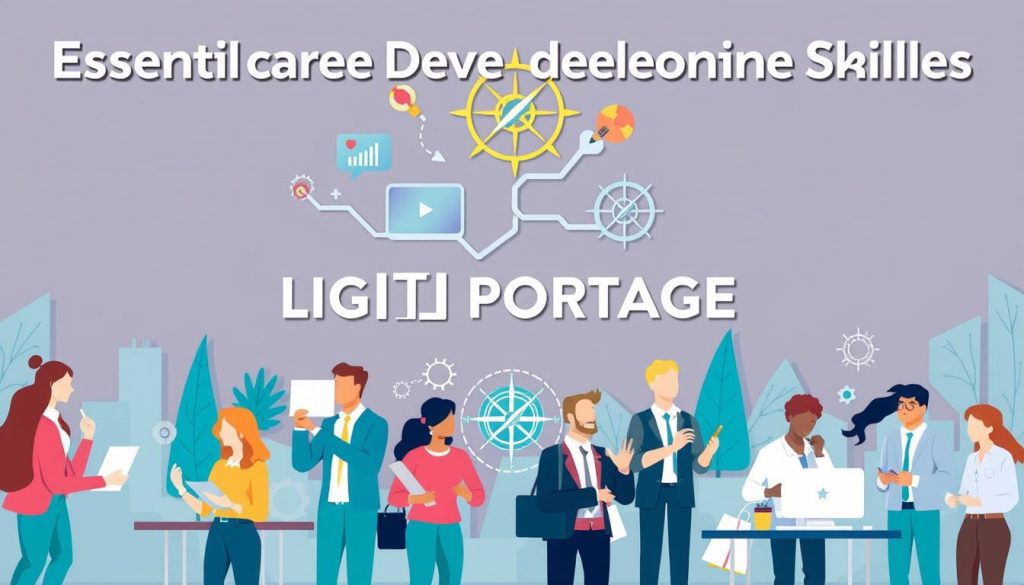Embarking on a journey of professional growth requires more than just ambition; it demands a strategic approach to navigating your career path. In today’s fast-paced and competitive landscape, understanding the fundamentals of career development is crucial for achieving long-term success.
As professionals, we must be proactive in seeking opportunities that enhance our skills and knowledge, allowing us to stay adaptable and relevant. Effective planning is key to making informed decisions about our future and maximizing our potential.
Table of Contents
Key Takeaways
- Understand the importance of a structured approach to career development.
- Identify key strategies for enhancing professional skills and knowledge.
- Learn how to navigate career opportunities effectively.
- Discover the role of planning in achieving career goals.
- Maximize your professional potential through informed decision-making.
Understanding Career Development in Today’s Professional Landscape
In today’s professional landscape, career development encompasses more than just climbing the corporate ladder. It involves a holistic approach to professional growth, including acquiring new skills, adapting to changing industry demands, and navigating the complexities of modern workplaces.
Defining Career Development and Its Components
Career development is a multifaceted concept that includes both job-specific skills and soft skills such as leadership, communication, and problem-solving abilities. It is about creating a robust career framework that allows professionals to grow both personally and professionally. Effective career development strategies enable individuals to stay relevant in their chosen industry and adapt to the ever-changing job market.
How Career Trajectories Have Evolved in Modern Workplaces
The traditional career ladder has given way to more dynamic career lattices, where professionals can move laterally to gain diverse experiences and develop broader skill sets. This shift is driven by factors such as remote work, digital transformation, and the gig economy, which have created more flexible career paths. Modern workplaces now value adaptability and continuous learning, encouraging employees to develop transferable skills that can be applied across various roles and industries.
| Traditional Career Approach | Modern Career Approach |
|---|---|
| Linear progression up the corporate ladder | Lateral moves and diverse experiences |
| Specialization in a single area | Development of transferable skills across industries |
| Fixed geographic location | Global opportunities with remote work |
As
« The way we work is changing, and it’s changing fast. The old rules don’t apply anymore. »
, said by an industry expert, encapsulates the essence of modern career development. Organizations are shifting toward flatter hierarchies, creating new challenges for career advancement and requiring professionals to redefine success beyond traditional promotions.
Why Career Development Is Important for Professional Growth
The importance of career development cannot be overstated, as it plays a pivotal role in the growth and success of professionals and organizations alike. Career development is not just about advancing in a career; it’s about creating a skilled and adaptable workforce that can drive innovation and productivity.
Benefits for Individual Professionals
For individual professionals, career development offers numerous benefits. It enables them to enhance their skills and stay relevant in their field. Through training programs and educational opportunities, employees can gain new perspectives and knowledge, making them more competitive in the job market.
- Career development helps individuals achieve their career goals and aspirations.
- It enhances their ability to adapt to changes in their industry.
- Employees who are engaged in development activities tend to be more innovative and productive.
Organizational Advantages of Supporting Employee Development
Organizations that invest in employee development reap significant benefits. It fosters a more skilled and adaptable workforce, improving productivity, innovation, and competitiveness. When employees feel their growth is supported, they are more likely to stay with the company, reducing turnover and the associated costs of recruitment and training.
- Organizations experience lower turnover rates as professionals are more likely to stay with companies that demonstrate a commitment to their growth.
- Supporting career development creates a pipeline of internal talent ready to step into leadership roles.
- It enhances the organization’s reputation as an employer of choice, attracting top talent.
Assessing Your Current Position and Setting Career Goals
As you navigate your career path, it’s essential to assess your current position and set clear career goals. This process involves understanding your strengths, weaknesses, and aspirations to create a tailored career development plan.
Conducting a Comprehensive Skills Assessment
A thorough skills assessment is vital to identify areas of excellence and those needing improvement. By evaluating your technical and soft skills, you can determine the steps required to enhance your professional capabilities and stay competitive in your industry.
Identifying Your Career Aspirations and Values
Understanding your career aspirations and core values is crucial for setting goals that align with your personal and professional objectives. Reflecting on what you want to achieve in your career and what matters most to you will guide your decision-making process.
Creating Effective Short-Term and Long-Term Career Goals
Setting short-term and long-term goals is essential for making progress on your career path. Effective goals are Specific, Measurable, Achievable, Relevant, and Time-bound (SMART), providing a clear direction and focus. By creating a balanced mix of skill development, performance, and experience goals, you can ensure comprehensive professional growth over time.
To achieve your career goals, it’s crucial to document them, regularly review and adjust your objectives, and share your goals with a mentor or trusted colleague for support and accountability. This structured approach will help you stay on track and make informed decisions about your career development plan.
Essential Skills for Career Development in Any Industry

The key to advancing in your career lies in understanding and developing essential skills that are versatile and valuable across various industries. As you navigate your professional journey, it’s crucial to focus on building a robust skill set that includes both technical skills and soft skills.
Technical Skills vs. Soft Skills: Finding the Right Balance
Technical skills are specific to your job or profession and are often acquired through formal education or training. On the other hand, soft skills are more about your ability to interact and work effectively with others. Finding the right balance between these two types of skills is essential for career success. While technical skills might get you hired, it’s your soft skills that will help you advance in your career.
A study by LinkedIn found that while 57% of leaders believe soft skills are more important than technical skills, only 45% of companies have formal training programs for soft skills. This gap highlights the need for professionals to take proactive steps in developing their interpersonal and leadership abilities.
Developing Interpersonal and Leadership Abilities
Interpersonal and leadership skills are critical for effective collaboration and team management. Developing these skills involves practicing active listening, empathy, and clear communication. It also requires a willingness to take on leadership roles and mentor others. By focusing on these areas, you can enhance your ability to work with diverse teams and drive projects forward.
Overcoming Imposter Syndrome and Building Confidence
Many professionals struggle with imposter syndrome, feeling as though they are not truly qualified for their roles.
« If you ever feel like you’re in over your head and about to get found out, you’re not alone. »
Recognizing that imposter feelings are common can help normalize the experience. To build confidence, it’s essential to focus on skill mastery, gradual exposure to challenging situations, and developing a more balanced perspective on failures and setbacks.
| Skill Type | Description | Importance |
|---|---|---|
| Technical Skills | Specific skills related to your job or profession | High |
| Soft Skills | Skills related to interacting and working with others | High |
| Interpersonal Skills | Skills that enable effective collaboration and communication | Very High |
Building a Strong Professional Network
Establishing a robust professional network is crucial for career growth and opportunities. As professionals, we often underestimate the power of a well-connected network until we need it. A strong network not only opens doors to new opportunities but also provides valuable insights and support throughout your career journey.
Effective Networking Strategies for Career Advancement
Effective networking is about building meaningful relationships rather than just collecting contacts. To advance your career, focus on quality over quantity in your networking efforts. Attend industry events, join professional organizations, and engage in online communities related to your field. Be clear about your career goals and what you can offer to others, and don’t hesitate to ask for advice or guidance when needed.
Finding and Working with the Right Mentor
Finding a mentor who understands your career aspirations and challenges can be a significant boost to your professional growth. Look for someone who is experienced, knowledgeable, and willing to invest time in your development. A good mentor can provide valuable insights, introduce you to new opportunities, and help you navigate complex professional situations. To maximize the mentorship, be prepared to discuss your goals, challenges, and progress.
Maximizing Informational Interviews and Professional Connections
Informational interviews are a powerful tool for gaining insights into your desired field or role. By reaching out to professionals in your industry and asking thoughtful, prepared questions, you can gain a deeper understanding of the opportunities and challenges within that field. Follow up with a thank-you note and keep the connection alive by sharing relevant information or checking in periodically. This approach not only expands your network but also demonstrates your proactive approach to career development.
| Networking Strategy | Description | Benefits |
|---|---|---|
| Attend Industry Events | Conferences, seminars, and workshops | Meet professionals, learn about industry trends |
| Join Professional Organizations | Membership in relevant associations | Access to resources, networking opportunities |
| Engage in Online Communities | Participate in forums and social media groups | Stay updated, connect with peers and leaders |
Strategic Career Development Planning
Career development is a journey that requires careful planning, intentional decision-making, and a clear understanding of your priorities. To achieve success, you must balance your career aspirations with your personal values and goals.
Creating Your Personalized Career Development Plan
To create a personalized career development plan, you need to assess your current position, identify your strengths and weaknesses, and set clear, achievable goals. This involves conducting a comprehensive skills assessment and understanding your career aspirations and values. By doing so, you can create a tailored plan that addresses your unique needs and priorities.
Consider your personal definition of success, including both career achievements and quality of life, to make intentional choices about which opportunities to pursue. You can find more information on achieving work-life balance on our blog: Trouvez votre équilibre travail-vie idéal.
The 30-60-90 Day Approach to Career Milestones
The 30-60-90 day approach is a strategic framework for achieving career milestones. This plan involves setting specific goals and objectives for the first 30, 60, and 90 days in a new role or career stage. By breaking down larger goals into smaller, manageable tasks, you can create a roadmap for success and track your progress.
- Set clear goals and objectives for each milestone
- Identify the skills and resources needed to achieve each goal
- Track your progress and adjust your plan as needed
Balancing Career Advancement with Work-Life Integration
Balancing career advancement with work-life integration is crucial for achieving sustainable career development. This requires setting boundaries around work hours, communication expectations, and personal time to create space for both professional development and personal fulfillment.
To achieve this balance, consider the following strategies:
- Set clear boundaries between work and personal life
- Prioritize your time and energy to focus on high-impact activities
- Regularly reflect on your satisfaction across all life domains to identify areas for adjustment
Navigating Salary Negotiations and Benefits
As professionals navigate their career paths, understanding salary negotiations and benefits becomes increasingly important. Effective management of these aspects can significantly impact one’s career trajectory and overall job satisfaction.
How to Research and Negotiate Compensation Effectively
Researching the market to understand the average salary range for your position is a critical step in negotiating compensation. Using data from reputable sources, you can make informed decisions and negotiate a salary that reflects your worth. It’s also essential to consider other benefits, such as health insurance, retirement plans, and paid time off, as part of your overall compensation package.
According to
« The key to successful salary negotiation is preparation and confidence. Knowing your worth and being able to articulate it effectively can make a significant difference. »
Understanding Stock Options and Other Benefits
Stock options and other benefits can be a significant component of your compensation package. Understanding how these work and their potential value is crucial. Stock options, for instance, give you the right to purchase company stock at a predetermined price, potentially leading to significant financial gains if the company’s stock performs well.
Preparing for Severance Situations and Career Transitions
While not always expected, severance situations can arise. Being prepared with a career transition plan can help you navigate these transitions more effectively. This includes understanding your severance package, which may include weeks or months of base salary, extended healthcare benefits, and assistance in finding a new job. It’s vital to review this package carefully before signing any agreements.
To prepare for such situations, consider the following strategies:
- Understand standard severance practices in your industry to negotiate effectively.
- Review employment contracts and company policies regarding severance.
- Maintain an emergency fund to cover 3-6 months of expenses.
- Develop a career transition plan outlining immediate steps to take if your position is eliminated.
By being proactive and informed, you can turn career transitions into opportunities for growth and reassessment, rather than mere setbacks.
How Employers Support Career Development

Employers play a crucial role in supporting the career development of their employees through various initiatives. By investing in employee growth, organizations not only enhance their workforce’s capabilities but also improve retention and job satisfaction.
Training Programs and Educational Opportunities
One of the primary ways employers support career development is through training programs and educational opportunities. These initiatives help employees acquire new skills and enhance their existing competencies. By providing access to workshops, seminars, and online courses, employers can ensure their employees stay updated with industry trends and best practices.
These programs are tailored to address specific skill gaps and are often designed in collaboration with industry experts. As a result, employees are better equipped to handle their current roles and are prepared for future challenges.
Mentorship and Coaching Initiatives
Mentorship and coaching initiatives are another critical component of employer-supported career development. These programs pair employees with experienced mentors or coaches who provide guidance, support, and feedback. Mentorship helps employees navigate their career paths, set realistic goals, and develop strategies to achieve them.
Through regular interactions with their mentors, employees gain insights into industry nuances and develop essential soft skills like leadership and communication. This personalized approach to development helps employees build confidence and overcome career-related challenges.
Cross-Functional Projects and Skill Development
Encouraging employees to participate in cross-functional projects is an effective way to broaden their skill set and expose them to different areas of the organization. These projects require individuals to collaborate with colleagues from other departments, promoting a deeper understanding of how various functions contribute to the company’s success.
- Cross-functional projects provide valuable exposure to different business areas, helping employees develop a broader organizational understanding and identify potential career paths they might not have previously considered.
- Participating in projects outside one’s primary role develops versatility and adaptability, qualities increasingly valued in rapidly changing business environments.
- Collaborative projects naturally develop critical soft skills like communication, negotiation, and influence as team members work across functional boundaries and navigate different perspectives.
Conclusion: Taking Ownership of Your Career Journey
Your career development is a personal responsibility that requires proactive effort. By taking ownership of your career journey, you can achieve greater job satisfaction and increased employability. To succeed, approach your career as an ongoing journey rather than a destination, continuously reassessing your goals and adapting your strategies.
Balance immediate opportunities with long-term aspirations to make strategic decisions that build toward your vision. Developing resilience and creating a personal board of advisors can enrich your career growth with diverse insights and support. Ultimately, aligning your professional growth with personal values creates a sense of purpose and meaning.
FAQ
What is the importance of having a career development plan?
Having a career development plan is crucial as it helps individuals identify their strengths, weaknesses, and areas for improvement, enabling them to set realistic goals and work towards achieving them.
How can I assess my current position and identify areas for growth?
To assess your current position, you can conduct a comprehensive skills assessment, identify your industry trends, and evaluate your job satisfaction, which will help you pinpoint areas that require improvement and create a roadmap for professional growth.
What are the essential skills required for career advancement?
The essential skills required for career advancement include a mix of technical skills, soft skills, and leadership abilities, which can be developed through training programs, mentorship, and hands-on experience.
How can I build a strong professional network?
Building a strong professional network involves attending industry events, leveraging social media platforms, and engaging in informational interviews, which can help you establish meaningful connections and stay informed about industry trends.
What role do employers play in supporting employee career growth?
Employers play a significant role in supporting employee career growth by providing training programs, mentorship initiatives, and opportunities for cross-functional projects, which can help employees develop new skills and advance in their careers.
How can I negotiate salary and benefits effectively?
To negotiate salary and benefits effectively, you should research industry standards, understand your worth, and be prepared to articulate your value to the organization, which can help you secure a fair compensation package.
What is the 30-60-90 day approach to career milestones?
The 30-60-90 day approach is a strategic planning framework that involves setting specific goals and objectives for the first 30, 60, and 90 days in a new role, which can help you establish a strong foundation and achieve early success.





